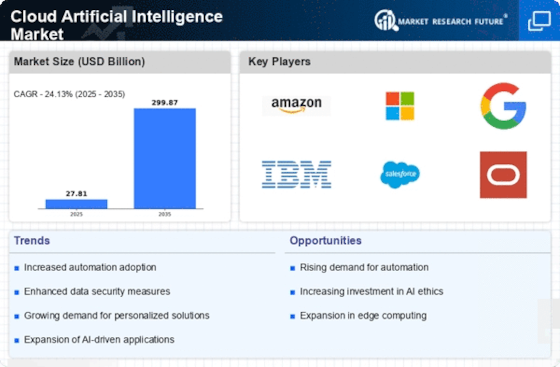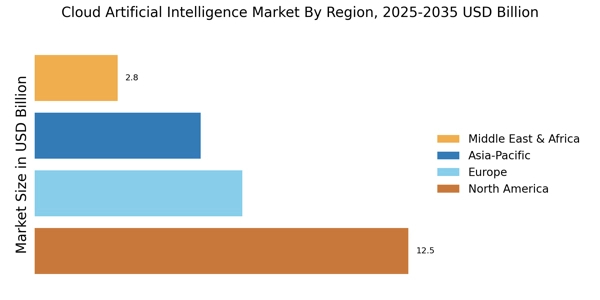Rising Demand for Automation
The Cloud Artificial Intelligence Market experiences a notable surge in demand for automation across various sectors. Organizations are increasingly seeking to streamline operations, reduce costs, and enhance efficiency through AI-driven solutions. According to recent data, the automation market is projected to reach USD 200 billion by 2025, indicating a robust growth trajectory. This demand is fueled by the need for businesses to remain competitive in a rapidly evolving landscape. As companies adopt cloud-based AI technologies, they can leverage machine learning and data analytics to optimize processes, thereby driving further investment in the Cloud Artificial Intelligence Market. The integration of automation not only improves productivity but also allows for better resource allocation, which is essential for sustaining growth in the current economic climate.
Integration of AI with IoT Technologies
The integration of artificial intelligence with Internet of Things (IoT) technologies is a pivotal driver in the Cloud Artificial Intelligence Market. This convergence allows for the collection and analysis of vast amounts of data generated by connected devices, leading to smarter decision-making processes. The IoT market is projected to reach USD 1 trillion by 2025, and its synergy with AI is expected to enhance operational efficiencies across various industries. By leveraging cloud-based AI solutions, organizations can analyze real-time data from IoT devices, enabling predictive maintenance, improved supply chain management, and enhanced product development. This integration not only drives innovation but also positions the Cloud Artificial Intelligence Market as a critical component in the digital transformation journey of businesses, fostering a more interconnected and intelligent ecosystem.
Advancements in Machine Learning Algorithms
The Cloud Artificial Intelligence Market is significantly influenced by advancements in machine learning algorithms. These innovations enable more sophisticated data analysis and predictive modeling, which are crucial for businesses aiming to harness the power of AI. Recent developments suggest that machine learning capabilities are becoming more accessible, allowing organizations of all sizes to implement AI solutions. The market for machine learning is expected to grow at a compound annual growth rate of 43% from 2020 to 2027, reflecting the increasing reliance on these technologies. As machine learning algorithms evolve, they enhance the functionality of cloud-based AI applications, making them more effective in addressing complex business challenges. This trend not only drives investment in the Cloud Artificial Intelligence Market but also fosters a competitive environment where companies strive to innovate and differentiate their offerings.
Growing Need for Enhanced Customer Experience
In the Cloud Artificial Intelligence Market, there is a growing emphasis on enhancing customer experience through AI technologies. Businesses are increasingly recognizing that personalized interactions can lead to higher customer satisfaction and loyalty. AI-driven solutions, such as chatbots and recommendation systems, are being deployed to provide tailored experiences that meet individual customer needs. Data indicates that companies utilizing AI for customer engagement can see a 30% increase in customer satisfaction scores. This trend is prompting organizations to invest in cloud-based AI solutions that facilitate real-time data analysis and customer insights. As the demand for superior customer experiences continues to rise, the Cloud Artificial Intelligence Market is likely to expand, driven by the need for innovative tools that enhance customer interactions and foster long-term relationships.
Increased Investment in AI Research and Development
The Cloud Artificial Intelligence Market is witnessing increased investment in research and development, which is crucial for driving innovation and technological advancements. Governments and private entities are allocating substantial resources to AI initiatives, recognizing the potential economic benefits. Recent statistics indicate that global investment in AI research is expected to exceed USD 100 billion by 2025. This influx of funding is likely to accelerate the development of new AI applications and enhance existing technologies. As organizations strive to stay ahead of the competition, they are more inclined to invest in cloud-based AI solutions that leverage cutting-edge research. This trend not only propels the Cloud Artificial Intelligence Market forward but also fosters a culture of continuous improvement and innovation, essential for addressing the evolving needs of businesses and consumers alike.

















